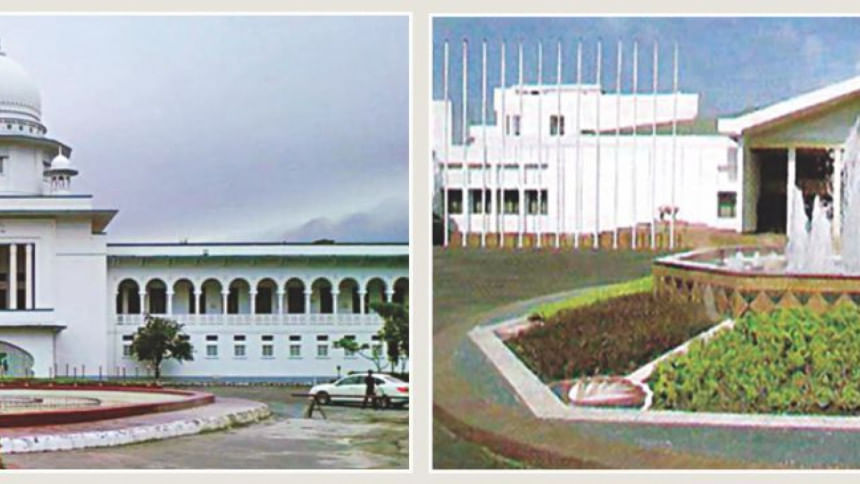PERCEIVED TENSION BETWEEN judiciary and executive of Bangladesh

The tension between the two principal organs of the government of Bangladesh, the judiciary and the executive, is not too far to be perceivable. Two recent statements by the Chief Justice (CJ) in Habigonj District Bar Association and by the Law Minister on the sculpture in front of the Supreme Court (SC) are symptomatic of this perceived tension. The CJ said that 'successive governments treated the judiciary unfairly and the administration never wanted the judiciary to run independently' and that 'the judiciary provided protection to the administration too and the bureaucracy always considered judiciary as its contender' (The Daily Star, 26 April 2017), a latent cry for judicial independence. The Law Minister made a statement that the government was not consulted for the sculpture in the SC premises (The Daily Star, 26 April 2017), covertly exonerating the government from any responsibility and potential political fall-out of the sculpture controversy. He also said that no country's CJ 'speak so much in public or express so much anger' about the judiciary-executive relationship (The Daily Star, 27 April 2017) and dual rule contradiction (The Daily Star, 1 November 2016), implicitly referring to the various public statements of the CJ of Bangladesh. Seemingly, these public views resuscitated the historic tension between the two organs of the government in the public domain.
The indispensable element of the independence of judiciary is the inviolable integrity and authority of the judiciary in terms of the freedom of judicial conscience and external interference in the performance of judicial functions in accordance with the rule of law. Judicial independence, however desirable, warrants certain specific measures to promote it. The Constitution of Bangladesh explicitly provides for an independent judiciary as one of its cornerstones and the guardian. The end in view was to establish rule-based governance, constitutional supremacy, and to holding other government organs, public institutions, and political and economic elites to restrain and remain within the bounds of law and accountable when function beyond the law. In reality though, the measures that Bangladesh adopted since its independence have rendered the judiciary subservient to the all-powerful executive. Changes in the form of government from parliamentary to presidential and to martial law were able to gradually make ground in, and assert influence on, the judiciary. The governments in power, civil and military alike, placed priority to political consideration and party affiliation over judicial independence and impartiality to making politically expedient judicial appointments.
Past governments made only rhetorical promises to separate the judiciary from the executive to appease legitimate yet popular demand for a constitutionally entrenched independent judiciary. The maintenance of a dependent judiciary helped the executive to commit illegal and unconstitutional acts with judicially endorsed immunity. The constitutional history of Bangladesh is littered with examples from fourth to seventh constitutional amendments and many in-between. The judiciary itself also played a restraining pliant role by abdicating its own powers and independence to the executive at the testing times of constitutional crises and emergencies. Being under the de facto control of the executive, the judiciary became an integral part and served the political interests of the ruling executive, rather than an independent judicial organ of the Republic. The reintroduction of the parliamentary government in 1991 made only cosmetic changes that ensured judicial independence to continue under the control of the executive. The public appreciation of judicial independence, impartiality, and transparency in judicial decision-making suffered from confidence crisis. Judicial independence is not a privilege for the judges. Rather it is meant to be a safeguard of the freedom and rights of all citizens under the rule of law. Greater judicial independence thus calls for specific measures to maintain and enhance public trust and confidence in the judiciary. The domineering culture of executive control and influence over the constitutional imperative of the separation of power has so far militated against the creation of an independent judiciary in Bangladesh.
The judicial independence under the present government appears to be a rollercoaster ride. There have been developments indicative of the judiciary starting gradually to drift apart from its previous pliable role to assume its role as the guardian of the Constitution. This is not to assert that the clout of the executive over the judiciary has dissipated altogether but weakened. There are instances of executive attempts to reclaim and regain control over the judiciary. The lower judiciary remains under the tight control of the executive, which still can transfer a lower court judge after the completion of trial proceeding and before pronouncing judgment only to initiate further proceedings to prolong the trial under a new judge, as precisely occurred in General Manjoor killing case ongoing since February 1995 in which General Ershad, special envoy of the Prime Minister, has allegedly been one of the prime suspects (The Daily Star, 25 February 2014 and Gulf Times 11 February 2014). The underlying- purpose of such executive act does not necessarily serve the interest of expeditious justice and reducing the backlogging, but may provide consequential short-term protection to the accused from potential adverse judgment. The 16th Amendment to restore the 1972 constitutional power of Parliament to impeach SC judges under dubious conditions is another example. The permeating executive control and unwillingness to relinquish control and influence on the judiciary is still being felt under the incumbent government.
Historically, adherence to the constitutional due process in the performance of executive functions is almost non-existent in Bangladesh ever since its independence. The form of government has changed in 1991 but the legacy of the invasive executive continues unabated in parliamentary governments. Good and responsible governance calls for a balanced judiciary, which is independent in exercising its judicial powers. Should the judiciary continue to function under the arms, rather than at arm's length, of the all-powerful executive, the preference of judges to judicial restraint over activism and to a pliant role over judicial independence and impartiality may not be gainsaid in view of the vulnerability of lower court judges and judicial impeachment by a Parliament devoid of any meaningful opposition and dominated by the executive. The omnipresence of invisible executive control over judicial independent decision-making is likely to continue unabated. There is a great deal of executive interest at stake in the total separation of the judiciary and the maintenance of a dependent judiciary has been politically expedient for the executive. It is therefore unlikely that the initiative for the independence of judiciary can reasonably be expected of any executive governments.
It also noteworthy that the judiciary itself displayed its judicial activism and took initiatives for its constitutionally entrenched separation from the executive in the landmark Masdar Hossain case. The SC issued a directive to the government to separate the judiciary from the executive within eight weeks, which prevailed in the government's appeal in November 2000 and reaffirmed in the review in June 2001. The SC formulated 12 directives for the government to immediately implement the separation that required no constitutional amendment. These SC rulings were binding for the government under Articles 102 and 112 of the Constitution but went unheeded. The then BNP-Jamat government procrastinated, sought 26 extensions of time to implement and eventually left the office in October 2006 without implementing. It is now reported (The Daily Star, 6 May 2017) that the government will seek further time for the gazette notification of rules determining discipline and code of conduct of lower court judges despite the SC's expressed dissatisfaction for the government's repeated failures to publish the code. Recently, in opening the foundation of a housing complex for judges the Prime Ministers publicly expressed her disappointment: 'if any law is declared null and void by a two-member bench then all efforts behind the process goes in vain' (The Daily Star, 15 April 2017). True but is it unusual in view of the judicial review power of the SC under Article 7 of the Constitution? Such an executive disappointment would not be to the wonderment of those who are familiar with the historic executive approach to the independence of the judiciary.
It is this judicial review power that enabled the SC to declare the 5th (Zia regime) and 7th (Ershad regime) amendments as invalid in the same way a legislation of the incumbent government has been declared unconstitutional. Bangladesh parliament is a creation of the Constitution, the supreme law of the Republic and there is no lawful authority which can legislate in a manner inconsistent with, or repugnant to, the Constitution. Parliament is not a sovereign law-making body as its law-making power is limited by the constitutional ambit, beyond which any law is likely to suffer from legitimacy crisis if challenged. Constitutional order in Bangladesh would sound hollow and self-defeating if parliament fails to operate within the given constitutional limits and the executive fails to respect the constitutional rule of law administered by the SC, the sole guardian and custodian of the Constitution.
The constitutional requirement of the separation of the judiciary has formally been fulfilled to dispense justice independently in January 2007 after 36 years of its subservience to the executive, which is largely attributable to the judicial activism of the SC. There appears to be no palatable alternative other than further higher judicial tenacity and activism in contriving ways to ensure the constitutionally entrenched separation and independence of the lower judiciary much along the line of the Masdar Hossain. The shagging-off this popular expectation and constitutional requirement may fuel public confidence crisis in the judiciary and be paradoxical to its status as the guardian of the Constitution. The real challenge for the independence of the entire judiciary is to make the vast empires of executive authority politically controllable and legally amenable to constitutional order. Otherwise, the cry for judicial independence, however loud and persistent, is likely to go unheeded and remain as elusive as it has been over the past decades.
The writer is Professor of Law, Macquarie University, Australia.

 For all latest news, follow The Daily Star's Google News channel.
For all latest news, follow The Daily Star's Google News channel. 




Comments